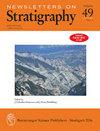The Messinian on Gavdos (Greece) and the status of currently used ages for the onset of the MSC and gypsum precipitation
IF 2.6
3区 地球科学
Q1 GEOLOGY
引用次数: 5
Abstract
. The Upper Tortonian and Messinian in the already classic Metochia section on Gavdos Island (Greece) is made up of deep marine, laminated and homogeneous marls with the latter being replaced by evaporitic limestones at the very top of the section. Previous tuning of the section to the La90 time series of northern summer insolation provided ages for sedimentary cycles, polarity reversals, and bioevents. Earlier work on foraminifers and stable isotopes focused on the last 2.45 Myr of the Tortonian and the first 470 kyr of the Messinian. This study extends the stable isotope record and the set of semi-quantitative data on planktonic foraminifers into the youngest 820 kyr of the section which include the precursor and initial stages of the Messinian Salinity Crisis (MSC). New and old foraminiferal oxygen and carbon isotope data have been combined into a ~25 kyr resolution record for the entire pre-evaporitic Messinian and show a major change at 6.74 ± 0.04 Ma which we interpret to reflect an abrupt change in salinity from normal marine to hypersaline and thus marks the prelude to the MSC. Field and thin-section observations on the limestones in the top of the section confirm their evaporitic origin and suggests that salinities has risen to values of >70 psu. We further discuss the biotic response to the two-step salinity increase during the Messinian. Tuning provides an age of 6.00 Ma for the base of the first evaporitic limestone on Gavdos and this age is therefore the age for the onset of the MSC in this part of the Mediterranean. An evaluation of the published ages for the MSC onset in sections Perales (SE Spain), Monticino (N Italy), and Falconara (Sicily) shows that the onset in Falconara, just as on Gavdos, begins at ~6.00 Ma with calcium carbonate precipitation, whereas in Perales and Monticino, onset begins at 5.97 Ma (similar to the currently used age of 5.971 Ma) with gypsum precipitation, i. e. some 30 kyr later than the onset of the MSC on Gavdos and Sicily (Falconara).加夫多斯(希腊)上的墨西尼亚人和目前使用的MSC和石膏沉淀开始的年龄状况
. 上托尔顿和墨西尼亚在加多斯岛(希腊)经典的Metochia部分是由深海、层状和均匀的泥灰岩组成的,后者被部分顶部的蒸发石灰岩所取代。先前将该剖面调整为北半球夏季日照的La90时间序列,提供了沉积旋回、极性逆转和生物事件的年龄。早期对有孔虫和稳定同位素的研究主要集中在托尔顿纪的最后2.45万年和墨西尼亚纪的前470万年。本研究将浮游有孔虫的稳定同位素记录和半定量资料扩展到该剖面最年轻的820 kyr,包括迈西尼亚盐度危机(MSC)的前兆和初始阶段。新旧有孔虫氧和碳同位素资料结合成整个前蒸发期的~25 kyr分辨率记录,显示出6.74±0.04 Ma的重大变化,我们认为这反映了盐度从正常海洋到高盐海洋的突变,从而标志着MSC的开始。对剖面顶部石灰石的实地和薄片观察证实了它们的蒸发起源,并表明盐度已上升到100 - 70 psu的值。我们进一步讨论了生物对迈西尼亚期盐度两步上升的响应。调谐提供了Gavdos上第一个蒸发石灰岩底部的年龄为6.00 Ma,因此这个年龄是地中海这部分MSC开始的年龄。对西班牙东南部的佩拉莱斯(Perales)、意大利北部的蒙蒂西诺(Monticino)和西西里岛的法尔科纳拉(Falconara)地区已发表的MSC开始年龄的评估表明,法尔科纳拉的MSC开始时间与加多斯一样,为~6.00 Ma,并有碳酸钙沉淀,而佩拉莱斯和蒙蒂西诺的MSC开始时间为5.97 Ma(与目前使用的5.971 Ma相似),并有石膏沉淀,即比加多斯和西西里岛(Falconara)的MSC开始时间晚30 kyr。
本文章由计算机程序翻译,如有差异,请以英文原文为准。
求助全文
约1分钟内获得全文
求助全文
来源期刊

Newsletters on Stratigraphy
地学-地质学
CiteScore
5.50
自引率
4.50%
发文量
22
审稿时长
>12 weeks
期刊介绍:
Newsletters on Stratigraphy is an international, peer-reviewed journal with a focus on stratigraphic issues that are relevant for a broad geoscientific community. Papers published in Newsletters on Stratigraphy use (and ideally integrate) stratigraphic methodologies from a wide field of disciplines, including (but not limited to) biostratigraphy, chronostratigraphy, chemostratigraphy, and magnetostratigraphy.
The results have implications for paleogeographic reconstructions, paleoceanography, paleoclimate, biotic evolution, basin development, or regional and supraregional correlation.
Papers published in Newsletters on Stratigraphy comprise original research articles, background information on ongoing work of e.g., the International Stratigraphic Commission (ICS) and the International Subcommission on Stratigraphic Classification (ISSC), and review articles. There are no page charges for the publication of regular papers.
 求助内容:
求助内容: 应助结果提醒方式:
应助结果提醒方式:


